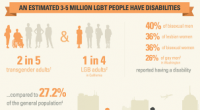Disability and the LGBTQ Community
Individuals with disabilities represent a significant portion of the population, yet they remain a marginalized group in society. Many people relate disability to physical attributes, but they can be mental attributes as well. It is the latter that is less visible and hence often misunderstood or ignored. LGBTQ individuals with disabilities face a double level of challenges when it comes to personal disabilities.
Research has shown that LGBTQ individuals are more likely to have a disability than the general population. Transgender individuals, for example, are prone to the mental impacts of isolation, intolerance, and more that stigmatizes them, and recent surveys have shown that 39 per cent of transgender individuals report having a disability. Similarly, one in three lesbians and one in three bisexual women report having a disability. The situation is significantly worse in countries with intolerant policies toward the LGBTQ communities.
Given this terrible situation, it is heartening to hear of individuals within the LGBTQ community who are working to address these challenges. Many of these individuals are activists, health workers, researchers, and politicians. A good portion of them are LGBTQ athletes who have received recognition for their athletic accomplishments at the national and international level and have become role models for the community.
Australia
- Stephen Dawson, politician
- Ness Murby, athlete
Belgium
- Marieke Vervoort, athlete
Canada
- Joanne Bernard, politician
- Persimmon Blackbridge, writer
- Ryan O'Connell, writer
- Cindy Ouellet, athlete
- Danielle Peers, athlete
Great Britain
- Lisa Egan, activist
- Claire Harvey, athlete
- David Hill, athlete
- Ellen Jones, activist
- Jessica Kellgren-Fozard, activist
- Robyn Love, athlete
- Lee Pearson, athlete
- Liz Sayce, activist
- Laurie Williams, athlete
India
- Jayna Kothari, law
Israel
- Moran Samuel, athlete
Japan
- Wataru Ishizaka, politician and teacher
- Aya Kamikawa, politician
Poland
- Jej Perfekcyjnosc, activist
Scotland
- Colin MacFarlane, activist
Singapore
- Theresa Goh, athlete
United States
- Jen Armbruster, athlete
- Andy Blevins, activist
- Eli Clare, poet and writer
- Christina Crosby, academic and writer
- Kenny Fries, writer
- Joan Guetschow, athlete
- Allison Jones,athlete
- Kody Keplinger, writer
- Hope Lewellen, athlete
- Angela Madsen, athlete
- Asya Miller, athlete
- Desiree Miller, athlete
- Dylan Orr, politics
- Gayle Salamon, academic
- Harry Wieder, activist
- Kathleen Rose Winter, athlete
Uruguay
- Gloria Escomel, journalist

